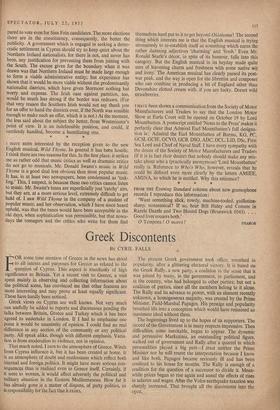Greek Discontents
BY CYRIL FALLS
.
FOR some time mention of Greece in the news has stood to all intents and purposes for Greece as related to the question of Cyprus. This aspect is manifestly of high significance to Britain. Yet a recent visit to Greece, a visit spent mainly in observing and collecting information about the political scene, has convinced me that other features are more interesting and may prove at least equally significant. These have hardly been noticed.
Greek views on Cyprus are well known. Not very much can usefully be added to reports and discussions pending the talks between Britain, Greece and Turkey which it has been agreed to undertake in London. If I had to emphasise one point it would be unanimity of opinion. I could find no real difference in any section of the community or any political party. All speak alike, though with different emphasis. Varia- tion is from moderation to violence, not in opinion.
That much noted, I turn to the atmosphere of Greece. Winds Front Cyprus influence it, but it has been created at home. It is an atmosphere of doubt and restlessness which reflect both internal and foreign politics. It might have more serious con- sequences than is realised even in Greece itself. Certainly, if it were to worsen, it would affect adversely the political and military situation in the Eastern Mediterranean. How far it has already gone is a matter of dispute, of party politics, as is responsibility for the fact that it exists. The present Greek government took office, wreathed in popularity, after a glittering electoral victory. It is based on the Greek Rally, a new party, a coalition in the sense that it was joined by many, in the government, in parliament, and in the country, who had belonged to other parties; but not a coalition of parties, since all the members belong to it alone. The Rally and its advance to power, with an element recently unknown, a homogeneous majority, was created by the Prime Minister, Field-Marshal Papagos. His prestige and popularity breathed life into a conception which would have remained an inanimate ideal without them.
The beginnings lived up to the hopes of its supporters. The record of the Government is in many respects impressive. Then difficulties, some inevitable, began to appear. The dynamic and persuasive Markezinis, an outstanding political figure, walked out of government and Rally after a quarrel in which personalities played a big part—I .trust neither the Prime Minister nor he will resent the interpretation because I know and like both. Papagos became seriously ill and has been confined to his house for months. The Rally is enough of a coalition for the question of a successor to divide it. Mean- while prices began to rise again and annul the effects of rises in salaries and wages. After the Volos earthquake taxation was sharply increased. That brought all the discontents into the open. The material trouble was the taxation. But Greeks, are natural debaters with lively, intelligent minds which tend to move from the concrete to the abstract. Greece has been too idealistic in a material world, said the men sitting outside the cafés after the day's work; she had played more than her part in open and ideological war against Communism; she had been the willing horse on which burdens were piled; it was time she 'looked to her own interests.'
Some guarded arguments in favour of a policy hardly to be called neutrality, but with a flavouring of it, have come from the right. This is new; but advocacy of such a course has been common form from the left, which shades into crypto-Com- munism, pure Communism being under a ban. Is there then danger of neutrality or Communism'? From some government quarters the answer is yes, privately though not publicly. There is no pretence that the latter is an immediate possibility or that its advance could be anything but gradual, but it is contended that the British too readily assume Communism to be incapable of revival. The Opposition—or rather the Oppositions, for the title 'United' is a misnomer—say that it is not and call the contrary view propaganda. They declare that it is the errors of the government which have caused dis- illusion and that they would repair the damage, but that in no case is Communism likely to increase by more than a trifling percentage. But as regards 'neutralism' one section of the Opposition accuses another of flirting with it.
This sort of thing leads to very critical examination of the defence budget. But whereas the country is said to be groaning under its weight, defence has weakened. The veteran com- manders of the Second World War and Bandit War have been replaced by young leaders with limited experience. It is right that leadership should be rejuvenated, but this has been done sweepingly instead of gradually. The other declensions have been due to cuts.
The Air Force has been the fortunate service. It has made good progress. Three squadrons are being re-equipped with Canadian Sabres, others getting less-modern jet aircraft. The pilots are excellent and full of zest. The Army has been under- going a reduction in the number of divisions kept in a high state of readiness by reducing the number of men with the Colours. Divisions in the first category, called `D-day readi- ness,' have been cut down to three. The Navy is in the worst case of the three, merely ticking over. Both defects are pre- carious. Mobilisation is at the best difficult in modern con- ditions for a country with only one road and one railway from north to south, and both mobilisation and maintenance would depend largely on sea transport with naval protection. The combination of weakening in land forces and stagnation in naval is thus serious.
The official Russian visit to Belgrade caused anxiety, even though the Greek Chief of Staff, visiting the Yugoslav capital for military talks, remained there throughout. The Balkan Pact was the conception, and in great part the work, of the Greek Prime Minister, a great piece of statecraft which immensely improved the strategic situation of Greece. The merest suspicion of any nibbling at it was disquieting. The final view was a little more cheerful. It was considered that Russia had neither embodied Yugoslavia among the satellites nor linked the Communist parties. Marshal Tito, it was said, had too much to lose to abandon the responsibilities of the pact and would never put himself at the mercy of Russia by cutting himself off from allies and providers of military equipment.
The Turkish alliance remains firm. Relations, however, have grown colder as the result of differences about Cyprus. Greeks protest that Britain has made too much of Turkish objections to enosis; some of them, and these not all extremists, allege that objections have been encouraged. One well-informed man said to me that Turkey was passing through a touchy phase which might develop into chauvinism and should not be stimulated.
This was my second visit to Greece within less than a year and revealed a very different state of affairs from that of 1954. In foreign and home politics, in finance, economics, and spirit, things had altered for the worse. Undoubtedly Greece had moved along an unfortunate path, though so far only a short distance. I gather that she may have moved a little farther since my return in June. All this undoubtedly amounts to what the Americans call 'a situation.' The position of Greece in the Eastern Mediterranean is more important than her fighting strength seems to warrant—and it is substantial. As usual, pessimists exaggerate ills and optimists good signs; more than usual indeed because party politics colour forecasts. To say, for instance, that Greece might 'pop behind the curtain' is gross misrepresentation. Yet a gradual deterioration is a pos- sibility. I say this, though not one of the pessimists.
It will be clear, I hope, that in my view Cyprus is a secondary factor in the phase I have discus'sed. At the same time I am sure a happy solution of the problem of Cyprus would come as a moral stimulant of incalculable value. Nothing would be more likely to act as such. It would also revive the old Anglo-Hellenic friendship, which has, thank God, persisted in personal relations amidst charge and counter-charge.



















































 Previous page
Previous page